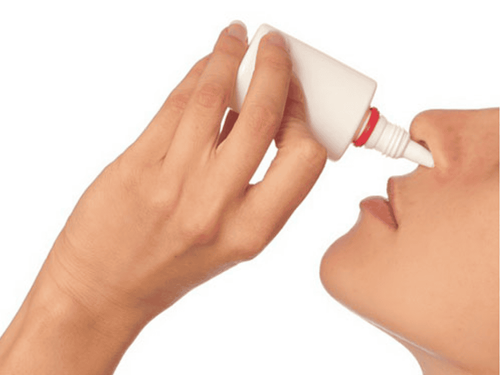This is an automatically translated article.
Diphen (diphenhydramine) is an antihistamine used to relieve symptoms of allergies, hay fever (allergic rhinitis), and the common cold. It works by blocking a certain natural substance (histamine) from being produced during the body's allergic reactions.1. How to use Diphene Diphenhydramine is an antihistamine used to relieve the symptoms of allergies, allergic rhinitis, and the common cold. These symptoms include rash, itching, watery eyes, itchy eyes/nose/throat, cough, runny nose, and sneezing. Diphen is also used to prevent and treat nausea, vomiting, and dizziness caused by motion sickness.
Diphenhydramine can also be used to help you relax and reduce feelings of sleepiness. This medication works by blocking a certain natural substance (histamine) that is made during the body's allergic reactions. The effect on symptoms such as watery eyes and runny nose is due to blocking another natural substance made by the body (acetylcholine). Cough and cold products have not been shown to be safe or effective in children under 6 years of age. Therefore, do not use this product to treat the symptoms of the common cold in children under 6 years of age unless specifically directed by a doctor. For children under 12 years old, some products (such as long-acting tablets/capsules) are not recommended.
These products do not cure or shorten the length of your cold and can cause serious side effects. To reduce the risk of side effects, follow all dosing instructions carefully. Do not use this product to make a child feel sleepy. Do not take other cough and cold medicines that may contain similar ingredients. Consult your doctor about home remedies for coughs caused by colds in children.
Before using diphene, follow all instructions on the product packaging. Take the medicine as directed by your doctor, if your doctor prescribes it for you.
Use the drug by taking it directly, with or without food. If the medicine is in liquid form, use a specialized measuring device to get the most accurate dose.
For tablets, they can be dissolved on the tongue and then swallowed, with or without water. Some other medicines need to be chewed well before swallowing.
Factors such as age, medical condition and response to treatment will determine the dose of the drug. There are many brands and forms of diphenhydramine available. Read the instructions for each product carefully because the amount of diphenhydramine can vary from product to product. Do not increase your dose or take this medication more often without your doctor's approval.
To prevent motion sickness, take your medicine about 30 minutes before starting an activity like traveling. To help you fall asleep, take the medicine about 30 minutes before bedtime. Tell your doctor right away if trouble sleeping continues for 2 weeks.
Contact your doctor if your condition does not improve.
2. Diphenhydramine side effects can cause drowsiness, dizziness, constipation, upset stomach, blurred vision, or dry mouth/nose/throat. If any of these symptoms persist or get worse, tell your doctor right away.
Please suck on hard candy (sugar-free) or shaved ice, chew gum (sugar-free), drink water to reduce the feeling of dry mouth.
If any serious side effects occur, including: Mental/mood changes (such as restlessness, confusion), difficulty urinating, fast/irregular heartbeat, tell your doctor right away. know.

Người bệnh nên thận trọng một số tác dụng phụ do Diphen gây ra
Call 911 immediately if seizures occur.
Here are some possible side effects after taking diphen:
Dizziness Drowsiness Good mood Rare side effects
Blood disorders Anaphylaxis Hemolytic anemia Hallucinations Low blood pressure Convulsions Change vision changes Irritability Tingling sensation in the skin Headache Migraine skin rash Macular rash Stomach bloating Refreshing Bladder not completely emptied Feeling of anxiety Blurred vision Chest discomfort Chills Wild Constipation Decreased appetite Diarrhea Difficult or painful urination Difficulty sleeping Double vision Dry mouth Dry nose Excessive sweating Heart pounding Headache Heart pounding Increased skin sensitivity to sunlight Severe abdominal pain Irritability Itching Loss of coordination Muscle tremors Anxiety Nightmares Tinnitus Tingling sensation Dry throat Difficulty breathing Wheezing The following conditions are contraindicated to diphenhydramine, including:
Overactive thyroid Increased pressure in the eye Angle-closure glaucoma High blood pressure Peptic ulcer Bladder obstruction g Prostatic hypertrophy Chronic idiopathic constipation Allergy to the antihistamine Diphen very rarely causes serious allergic reactions in users. However, get medical help right away if you notice any of these symptoms: rash, itching/swelling (especially of the face/tongue/throat), severe dizziness, trouble breathing.

Diphen có thể tình trạng khó thở cho người bệnh
Tell your doctor immediately if you experience any unusual signs after taking diphen.
3. Precautions Before taking diphenhydramine, tell your doctor if you are allergic to the drug, or to dimehydrinate, or to any other allergic reaction. Diphen may contain inactive ingredients that can cause allergic reactions or other problems, so consult carefully before taking.
Share with your doctor your medical history, especially of: Breathing problems (such as asthma, emphysema), increased intraocular pressure (glaucoma), heart problems, high blood pressure, liver disease, epilepsy, stomach/intestinal problems (ulcers, blockages), overactive thyroid (hyperthyroidism), difficulty urinating (e.g., enlarged prostate) .
Taking diphene can make you dizzy, drowsy, or blur your vision. Limit the use of alcoholic beverages while using this medicine. If you are taking marijuana, let your doctor know this information.
Send a list of all the medicines you are taking to your doctor before surgery.
Liquid products, tablets or soluble tablets may contain sugar or aspartame. Liquid diphene may also contain alcohol. Caution is advised if you have diabetes, liver disease, phenylketonuria (PKU), or any other condition that requires limiting/avoiding these substances in your diet. The side effects of diphen may become more sensitive when used in children. Diphenhydramine can often cause euphoria in young children instead of drowsiness.
Older adults may be more sensitive to the side effects of this medicine, especially drowsiness, dizziness, confusion, constipation, or trouble urinating, putting you at higher risk of falling.
During pregnancy, use diphenhydramine only if absolutely necessary. Consult your doctor before using the drug.
Lactating women should be cautious when taking this medicine.
4. Interactions Interactions between drugs affect the way a drug works or increase the risk of serious side effects. Therefore, your doctor needs to know the complete list of medicines you are taking, including over-the-counter medicines. Unless directed by your doctor, do not stop, increase the dose or change the medicine suddenly.
Diphen may interact with certain products such as: Topical antihistamines (such as diphenhydramine cream, ointment, spray).
If you are taking other products that cause drowsiness such as opioid pain relievers or cough suppressants (such as codeine, hydrocodone), alcohol, marijuana, sleeping pills, muscle relaxants (such as carisoprodol, cyclobenzaprine), or antihistamines (such as cetirizine, chlorpheniramine), tell your doctor.
Check the product information on the packaging of your medicines (such as allergy or cough and cold products) as they may contain ingredients that cause drowsiness.

Diphen có thể tương tác với một số loại thuốc khi kết hợp cùng nhau
If an overdose of the drug occurs and severe symptoms such as fainting or difficulty breathing, call 911. An overdose of diphene can cause a number of symptoms such as: Severe drowsiness, convulsions, open pupils wide. In children, mental/mood changes (such as restlessness, irritability, hallucinations) may precede drowsiness.
Take your medicine as soon as you remember if you missed a previous dose.
Diphenhydramine should be stored at room temperature, away from moisture and light.
Please dial HOTLINE for more information or register for an appointment HERE. Download MyVinmec app to make appointments faster and to manage your bookings easily.
Reference source: webmd.com













